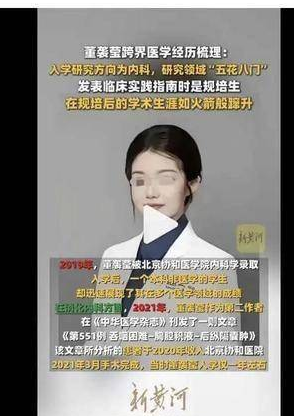The scandal involving Dr. Xiao Fei at China-Japan Friendship Hospital continues to unfold, with the National Health Commission of China stepping in to investigate the case. The focus remains on the academic background and career path of Dong Mouying, whose involvement in the scandal has raised serious questions about the integrity of Peking Union Medical College’s (PUMC) “4+4” program.
National Health Commission Launches Investigation
On April 30, the National Health Commission announced that it had formed a special investigation team to look into the allegations against Dr. Xiao Fei and Dong Mouying. The investigation will cover the incident where Dr. Xiao Fei allegedly left an anesthetized patient unattended during surgery, as well as the broader issues surrounding Dong Mouying’s academic and professional journey. This move comes in response to public demands for transparency and accountability in the medical education system.
PUMC’s “4+4” Program Under Scrutiny
Dong Mouying’s rapid progression through the medical education system has led to increased scrutiny of PUMC’s “4+4” program. The program, launched in 2018, allows students with non-medical undergraduate degrees to pursue a medical doctorate in just four years. Critics argue that this accelerated pathway may compromise the quality of medical education and provide undue advantages to certain individuals.
Dong Mouying’s academic record has been a particular point of contention. She completed her undergraduate studies in economics at Barnard College, Columbia University, before entering PUMC’s “4+4” program. Her doctoral thesis, which focused on gynecological imaging, was supervised by an orthopedic surgeon, raising questions about the relevance and quality of her research. Additionally, her academic achievements, including 11 interdisciplinary papers published in just three years, have been criticized as lacking depth and rigor.
Public Calls for Transparency and Reform
The public has expressed significant concern over the perceived lack of transparency and potential favoritism in the “4+4” program. There are calls for PUMC to release detailed information about the admission process, including the criteria for selecting candidates and the evaluation of their academic achievements. Many are also demanding reforms to ensure that the program maintains high standards of academic integrity and fairness.
Potential Impacts and Future Directions
The outcome of the National Health Commission’s investigation could have far-reaching implications for PUMC’s “4+4” program and the broader medical education system in China. If the investigation uncovers significant flaws or irregularities, it could lead to reforms aimed at strengthening oversight and ensuring fairness in the selection and training of medical students. The case has also highlighted the need for greater transparency and accountability in academic and professional settings.
As the investigation progresses, the medical community and the public will be closely watching to see how PUMC and the National Health Commission address these critical issues. The outcome will not only impact the individuals involved but also shape the future direction of medical education in China.
